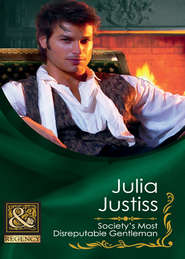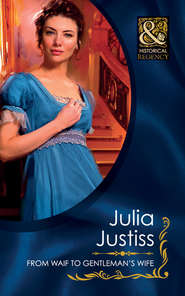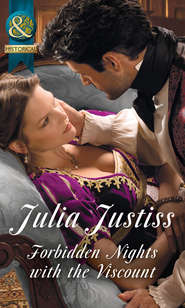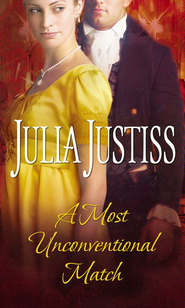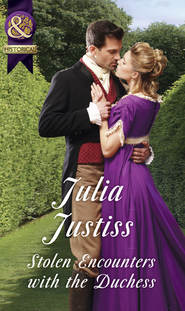По всем вопросам обращайтесь на: info@litportal.ru
(©) 2003-2025.
✖
Regency Secrets: My Lady's Trust
Автор
Год написания книги
2019
Настройки чтения
Размер шрифта
Высота строк
Поля
His eyes narrowed as he swiftly assessed the daringly low-cut gown, the guinea-bright curls, the perfect skin, pouting lips—and bright, hard eyes. A self-absorbed beauty.
“Yes, I remember, Lady Ardith,” he said, bringing her fingers to his lips for the obligatory salute. “And how is your husband, Lord Asquith?”
She flapped long painted lashes and gave him an overly familiar smile whose hint of shared intimacy he immediately resented. “Preoccupied as usual, my lord. Poor me—I so often have to find my own … amusements.”
He knew he wasn’t imagining the barely veiled innuendo, and his assessment of her character dropped lower. So Lady Ardith enjoyed collecting titled lover pelts, did she? He determined on the instant to discourage the connection.
But when he tried to reclaim his hand, she clutched it, causing him to automatically glance at his fingers—straight at the lavish breasts just below them, revealed to any downward-gazing eye all the way to the taunting pink edge of the nipples. A quick sideways glance confirmed the squire’s gaze was riveted on the view.
He looked back up to catch his sister’s amused but sympathetic eye. “Lady Ardith tells me her husband owns property in the neighborhood,” Elspeth said, “and they often spend a few weeks here when not occupied in London.”
“On those occasions when Lady Ardith—and Lord Asquith, of course—choose to honor us, their company is always a valued addition to our society,” the squire said.
Lady Ardith leaned further forward as she squeezed the squire’s hand. “Dear Squire Everett! How could I not attend your gatherings as often as possible when I know such a gallant gentleman awaits me?”
The squire paused, apparently too distracted for speech while he struggled between the propriety of raising his eyes to her face and the titillation of visually fondling the display beneath his nose.
Beau watched a knowing smile curve the corners of Lady Ardith’s lips and his disdain increased. He’d bet the price of her elegant gown that, even bored to flinders in what she no doubt considered a rustic outpost, Lady Ardith would never consider adding the middle-aged, balding squire to her list of indoor sportsmen. Yet she seemed driven, as beautiful females often were, to captivate every male who crossed her path, whether she valued his regard or not.
Attracting a man of Beau’s wealth and rank likely would interest her, he thought cynically. Since he had no desire whatsoever to help Lady Ardith beguile the tedium of her country sojourn, he’d end this game at once.
While she toyed with the squire, Beau crossed the room and usurped her seat beside his sister. Lady Ardith’s self-satisfied smile wavered briefly when she discovered his move, but brightened again after the squire led her by the hand to a chair beside his own.
“Squire Everett, you must give a ball in honor of Lord Beaulieu and Lady Elspeth!” the lady exclaimed. “I should do so myself, but since we open the house here for such short periods, we do not maintain sufficient staff.”
A pinch-penny, as well, Beau thought, disgusted. “With my brother’s health so uncertain, I do not believe we could consider a ball. And at present, Lady Elspeth’s health is too … delicate for dancing,” he replied.
“His lordship’s got the right of it,” the squire agreed. “With young master Kit still so ill, ‘twould not be fitting to disport ourselves at a ball.”
“You are right of course, my lord. A dinner, then,” Lady Ardith persisted. “Something rather more quiet, with just the first families of the neighborhood in attendance. That would not tax Lady Elspeth’s strength, for she could retire early. I should be happy to preside over the tea tray for you, Squire Everett.”
“His sister, Lady Winters, could do so,” Beau said.
His repressive tone didn’t seem to dampen the lady’s pretensions a bit. “Ah, dear Lady Winters? Is she visiting you currently? I thought she’d removed to Bath.”
“No, surely you remember, Lady Ardith, she returned here when her husband died two years ago,” the squire said.
Lady Ardith trilled a laugh. “Oh, yes, how silly of me.” She waved a hand, dismissing Lady Winters. “I fear I have no head at all for dates and figures.”
“A dinner would be lovely,” Elspeth intervened, wary of the growing irritation she no doubt perceived in Beau’s expression. “Assuming Kit continues to improve, Dr. MacDonovan will want to depart by the week’s end. Before he goes, we should like to do something to honor him. And Mrs. Martin, of course.”
“Aye, it could be a tribute to both our angels of mercy,” the squire concurred.
Beau opened his lips to squash the idea. He had no intention of providing both the forum and the target for Lady Ardith’s next hunt.
But then he reconsidered. With a little arranging he could pawn that lady off on Mac and the vicar—and arrange to have himself seated near Mrs. Martin.
Mrs. Martin, her auburn hair freed from the ubiquitous cap, her form garbed in something more becoming than the awful brown sacks she habitually wore. His Sparrow in evening dress.
To savor that vision would be worth fending off a dozen Lady Ardiths.
“A capital idea, Squire Everett,” he said. “The doctor and Mrs. Martin deserve our most warmest gratitude.”
Lady Ardith’s look of triumph faded. “Mrs. Martin? That local—herb woman—was allowed to tend your brother!”
“She saved his life, as the doctor will testify,” Beau said, “and deserves the highest commendation.”
“Your desire to acknowledge her is most kind, my lord, but … at a dinner?” Lady Ardith interjected. “Such a lowly personage would doubtless be most uncomfortable to be seated at a social gathering among her betters.”
“Nonsense,” the squire returned. “Mrs. Martin’s gentry-born—her late husband was an army officer—and has dined with us on several occasions.”
Better and better, Beau thought, his enthusiasm for the dinner party growing. Since Mrs. Martin had apparently already appeared at neighborhood social gatherings, she would not be able to escape with that excuse.
“It’s settled then,” Beau said. “On Friday, shall we say? Dr. MacDonovan told me this morning he hopes by then to declare Kit finally out of danger.”
“Squire Everett, will arranging a dinner party on such short notice be too much for your sister?” Elspeth asked.
“Not a bit,” Squire Everett replied cheerfully, obviously taken with the idea. “If she falls prey to the vapors, Mrs. Martin can help out. She’s assisted Emily before. A lady of many talents, our Mrs. Martin.”
“So it appears,” Beau murmured.
Lady Ardith continued to haggle over the wisdom of including an unattached lady in the gathering, but convinced the squire would go through with the plan whether Lady Ardith chose to attend or not, Beau let the conversation fade to a babble while he set about reviewing the pleasing implications.
This dinner might be just the thing to breach Mrs. Martin’s reserve for good. If she appeared at the party to receive the admiration and respect he knew her loveliness would generate, perhaps that acclaim would cause some of her nervous reticence to fade. Even better, he’d be able to pay her gentle, persistent attention in a forum where such behavior was entirely appropriate, nothing to inspire alarm. Once she grew less wary and more comfortable around him, he’d finally be able to get close enough to demonstrate his genuine respect and concern.
Surely then she would come to trust him—and heed the call that impelled her to come to him.
The next afternoon, in a pretty note begging her pardon for the inconvenience, Lord Beaulieu’s sister asked Laura to join her in the sitting room attached to her chamber, as she found herself too weary after her journey to come downstairs. Bowing to the inevitable, Laura steeled herself for the interview.
As Lady Elspeth was several years older, she had already come out, married, and left London to raise a family by the time Laura made her debut. So there was no chance whatsoever, Laura told herself, trying to squelch her ever-present anxiety, that Lord Beaulieu’s sister might recognize her.
Deliberately garbing herself in the ugliest of Aunt Mary’s gowns and the most voluminous of the lace dowager caps, Laura forced her face into a mask of serenity and knocked at the door of Lady Elspeth’s sitting room.
But as she entered, a small figure bounded up. “Did you nurse Uncle Kit and keep the angels from taking him to heaven?” she demanded.
“Catherine!” her mother protested from her reclining position upon the sofa. “You mustn’t pounce upon people like that. Greet Mrs. Martin properly, if you please.”
With a sigh the girl straightened, then dipped a curtsey. “Good day, Mrs. Martin. I trust you are well?”
The speech was so clearly parroted—and practiced—Laura had to smile. “Good day to you, Lady Catherine. I am quite well, thank you. And you?”
“Very well, but Mama’s not. That’s why she’s so cross. Uncle Beau said you kept the angels from taking Uncle Kit. I’m so glad! He’s ever so much fun, and I’m not finished with him yet.”
The vision of angels tussling over Kit Bradsleigh’s bed tickled Laura’s whimsy, and some of her nervousness fled. She took the hand Lady Catherine held out and walked with her to the sofa.
“Perhaps God wasn’t ready for him yet,” Laura said. Unlike my Jennie. A dull ache permeated her at the unbidden thought, and wearily she suppressed it. “But Dr. MacDonovan did most of the work, you know.”
The little girl looked thoughtful, then nodded. “Angels would surely leave Dr. Mac alone. He talks too loud and he makes you drink nasty medicine.” She gestured to Lady Elspeth. “I think that’s why mama is sick.”






